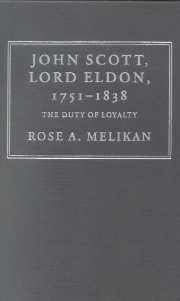Book contents
- Frontmatter
- Contents
- List of illustrations
- List of tables
- Preface
- List of abbreviations
- 1 A man of laws
- 2 An independent learned gentleman
- 3 A government retainer
- 4 Formal politics
- 5 Engagement
- 6 Setbacks
- 7 Resolution
- 8 Pater familias
- 9 Upright intentions
- 10 The King's man
- 11 The practice of patronage
- 12 Cut and thrust
- 13 A servant may serve two masters
- 14 Reform and revolution
- 15 The Speaker speaks
- 16 Lord Endless
- 17 Faithful defender
- 18 Twilight of the State
- Bibliography
- Index
- Plate Section
13 - A servant may serve two masters
Published online by Cambridge University Press: 07 August 2009
- Frontmatter
- Contents
- List of illustrations
- List of tables
- Preface
- List of abbreviations
- 1 A man of laws
- 2 An independent learned gentleman
- 3 A government retainer
- 4 Formal politics
- 5 Engagement
- 6 Setbacks
- 7 Resolution
- 8 Pater familias
- 9 Upright intentions
- 10 The King's man
- 11 The practice of patronage
- 12 Cut and thrust
- 13 A servant may serve two masters
- 14 Reform and revolution
- 15 The Speaker speaks
- 16 Lord Endless
- 17 Faithful defender
- 18 Twilight of the State
- Bibliography
- Index
- Plate Section
Summary
In the autumn of 1812, Eldon wrote to his friend, the Revd Samuel Swire, to apologise for the recent lapse in his correspondence:
I can only assure you that my attention has been utterly distracted, by the events of a year, which, in their extraordinary nature, so far as they respect myself, have surpassed all the extraordinary circumstances which even my chequered life has produced.
Nor was this an exaggeration of the political turmoil from which Eldon had recently emerged, though perhaps a period of eighteen months would have more accurately described its duration. Between November 1810 and June 1812, the different pressures which had hitherto characterised his public life as Lord Chancellor encroached upon him more intensively and with fewer opportunities for relief. Where he had previously considered royal illness, he addressed complete incapacity; where his conduct had elicited political criticism, it provoked accusations of criminality; and where he had responded to ministerial resignation, he witnessed assassination. The King's illness in the autumn of 1810 ushered in a period of unrelenting turmoil for the government, but more particularly for the Chancellor, whose official and personal relations with the Royal Family imposed special burdens and occasioned the exercise of special powers. Eldon's ability to cope with both would determine whether his own career would terminate in a retirement likely to be as permanent as the King's.
Eldon's role as adviser particularly on royal matters had not gone into abeyance following his return to office in 1807.
- Type
- Chapter
- Information
- John Scott, Lord Eldon, 1751–1838The Duty of Loyalty, pp. 230 - 249Publisher: Cambridge University PressPrint publication year: 1999



